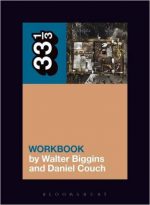I’m realizing now how much of my jazz sensibility I owe to that June 2000 issue of Down Beat. Again, I had it because Phish was on the cover, and inside the band was treated respectfully—even as the writer sniffed that they weren’t quite jazz. (They never said they were.) That review of Ghost Town led me to new explorations of what an electric guitarist could do. In the same section, Susie Ibarra Trio’s Radiance was also awarded the magazine’s highest rating, with the writer going out of his way to mention that Ibarra (the drummer/composer) had been quietly stealing scenes from bands led by David S. Ware and Wadada Leo Smith for years, that her voice was so unusual that she felt like the unexpected leader of whatever band she was in.
The drummer as leader? Despite having two good friends (a brother and sister, it turns out) who were dedicated to drums, and despite spending more of my hip-hop listening engaged with production (that is to say, beats) than rapping, the idea that a drummer could be a band’s driving force had never occurred to me. I tried to find Radiance but it was impossible to find or even order in Jackson, MS. Online CD buying was in its infancy; I’m not sure Amazon offered music for sale in 2000, and my connection was dial-up, anyway. I filed Ibarra away as someone to seek out later.
Well, that drummer friend—who later became a co-writer of a book with me—lived in Austin, where the music stores were better. He gave it to me as a birthday present, muttering, “You know, I almost kept that for myself.” I understood as soon as I hit PLAY. What I wrote in 2009 still applies, though I’ve edited it some:
Drummer Susie Ibarra prefers insinuation to muscularity, not that she can’t do the shakalakaboom. But she likes cymbal flourishes, woodblocks, and rimshots, and so her sound astonishes by slow burn. She builds melodies, so much so that her timekeeping skills seem less than adept on first listen. Listen again, to, say, “Radiance: Dreams,” where her nuanced solo develops into intricacies so like guitar notes that it’s hard to note the perfect bass drum accompaniment. Other times, as in the third section of the “Radiance” suite (“Laughter”), Ibarra subsides her rhythmic pulse so much that she lets Cooper-Moore’s diddley-bo do all the work. Cooper-Moore plonks and glides with piano and harp throughout this set, and violinist Charles Burnham adds a jagged, rockish edge to the proceedings. Ibarra’s compositions—everything here but a cover of Jimi Hendrix’s “Up from the Skies” is hers—are open-ended, beginning and ending in clusters that don’t quite resolve, for all their loveliness. They’re pastoral in sound but less than peaceful in their nervous jumps from section to section. Even a ballad such as “Half Moon” seems pregnant with worry; Burnham’s shriek-like bowing helps to shake things up. It is, though, Ibarra’s show. She propels, coaxes, withdraws, adds colors, and otherwise reads her other players’ needs telepathically. She reads her own, too, and her flights of fancy—the solo during “A Glimpse,” her brushwork in “Jagged Threads”—provide the greatest pleasure of all.
At that point, I had never heard a jazz trio that wasn’t the standard bass-drums-piano format, so this bassless version seemed like it could go anywhere, without a clear center. But no, not quite. Ibarra held it all together, using percussion in ways that were unfamiliar to me but that opened up the world. The avant-garde never seemed so inviting, in part because it was so accessible, so insistently beautiful, so (yes) rhythmic even amidst the melodic weirdness, so dope.
It’s all over in 50 minutes, and the last five minutes are alternate takes of earlier pieces. I wanted it to go on forever but it never came around again. To my knowledge, this is the only time these three musicians recorded together. That’s a shame but it’s also enough. If Ben Webster and Associates is the perfect jazz record because it’s so quintessential, such a standard-setter, so emblematic of the form at its best, Radiance is the perfect jazz record because it’s so singular and idiosyncratic, so much itself that only this particular group could have created it. I meditate to this. I pray to this. I write with this on. In a way, it is my standard for jazz. As in: For any improvised music I hear, I compare it to Radiance. Some records come close to it, or are even as good as it. But nothing matches it.


